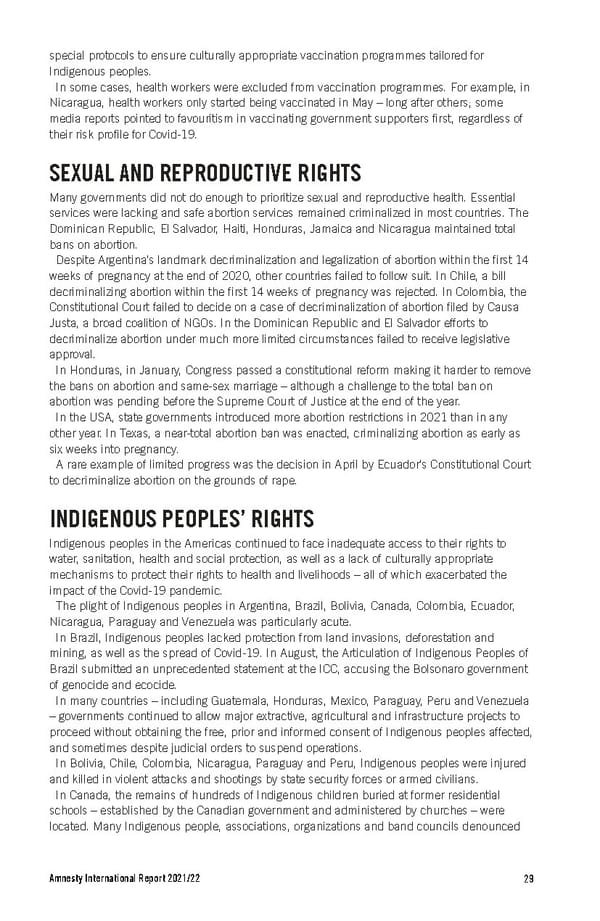special protocols to ensure culturally appropriate vaccination programmes tailored for Indigenous peoples. In some cases, health workers were excluded from vaccination programmes. For example, in Nicaragua, health workers only started being vaccinated in May – long after others; some media reports pointed to favouritism in vaccinating government supporters first, regardless of their risk profile for Covid-19. SEXUAL AND REPRODUCTIVE RIGHTS Many governments did not do enough to prioritize sexual and reproductive health. Essential services were lacking and safe abortion services remained criminalized in most countries. The Dominican Republic, El Salvador, Haiti, Honduras, Jamaica and Nicaragua maintained total bans on abortion. Despite Argentina’s landmark decriminalization and legalization of abortion within the first 14 weeks of pregnancy at the end of 2020, other countries failed to follow suit. In Chile, a bill decriminalizing abortion within the first 14 weeks of pregnancy was rejected. In Colombia, the Constitutional Court failed to decide on a case of decriminalization of abortion filed by Causa Justa, a broad coalition of NGOs. In the Dominican Republic and El Salvador efforts to decriminalize abortion under much more limited circumstances failed to receive legislative approval. In Honduras, in January, Congress passed a constitutional reform making it harder to remove the bans on abortion and same-sex marriage – although a challenge to the total ban on abortion was pending before the Supreme Court of Justice at the end of the year. In the USA, state governments introduced more abortion restrictions in 2021 than in any other year. In Texas, a near-total abortion ban was enacted, criminalizing abortion as early as six weeks into pregnancy. A rare example of limited progress was the decision in April by Ecuador’s Constitutional Court to decriminalize abortion on the grounds of rape. INDIGENOUS PEOPLES’ RIGHTS Indigenous peoples in the Americas continued to face inadequate access to their rights to water, sanitation, health and social protection, as well as a lack of culturally appropriate mechanisms to protect their rights to health and livelihoods – all of which exacerbated the impact of the Covid-19 pandemic. The plight of Indigenous peoples in Argentina, Brazil, Bolivia, Canada, Colombia, Ecuador, Nicaragua, Paraguay and Venezuela was particularly acute. In Brazil, Indigenous peoples lacked protection from land invasions, deforestation and mining, as well as the spread of Covid-19. In August, the Articulation of Indigenous Peoples of Brazil submitted an unprecedented statement at the ICC, accusing the Bolsonaro government of genocide and ecocide. In many countries – including Guatemala, Honduras, Mexico, Paraguay, Peru and Venezuela – governments continued to allow major extractive, agricultural and infrastructure projects to proceed without obtaining the free, prior and informed consent of Indigenous peoples affected, and sometimes despite judicial orders to suspend operations. In Bolivia, Chile, Colombia, Nicaragua, Paraguay and Peru, Indigenous peoples were injured and killed in violent attacks and shootings by state security forces or armed civilians. In Canada, the remains of hundreds of Indigenous children buried at former residential schools – established by the Canadian government and administered by churches – were located. Many Indigenous people, associations, organizations and band councils denounced Amnesty International Report 2021/22 29
 Amnesty International Report 2021/22 Page 28 Page 30
Amnesty International Report 2021/22 Page 28 Page 30